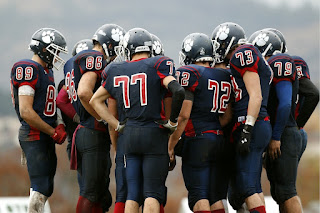The quarterback in American football is a critical position and often considered the most important player on the field. Their role is multi-faceted, encompassing leadership, decision-making, and execution of offensive plays. Here is an overview of the quarterback's responsibilities and role in the game.
Field General: The quarterback is responsible for leading the team's offense. They are typically the primary communicator, relaying plays and adjustments to the rest of the offense. They need to possess strong leadership qualities, such as confidence, communication skills, and the ability to inspire their teammates.
Play Calling: The quarterback works closely with the coaching staff to call the plays and make adjustments based on the defensive alignment. They must have a comprehensive understanding of the team's offensive system and be able to read the defense to make informed decisions.
Pre-Snap Responsibilities: Before the ball is snapped, the quarterback reads the defensive formation and adjusts the play if necessary. This can include changing the blocking assignments, calling audibles, or shifting the formation to exploit weaknesses in the defense.
Ball Distribution: The quarterback is responsible for distributing the ball to the appropriate receivers. They must make quick and accurate decisions on where to throw the ball based on the progressions in the play design and the movements of the defense. This requires a strong arm, good accuracy, and the ability to make split-second decisions under pressure.
Leadership in the Pocket: The quarterback often operates from the pocket, a designated area behind the offensive line. They must demonstrate poise, awareness, and the ability to maneuver within the pocket to avoid incoming defenders while maintaining their focus downfield.
Offensive Strategy Execution: The quarterback is responsible for executing the offensive game plan, making sure that all players are in the right positions, and coordinating the timing and execution of plays. They must make quick decisions based on the situation, including whether to hand off the ball to a running back, throw a pass, or run with the ball themselves.
Late-Game Situations: In high-pressure, late-game situations, the quarterback's role becomes even more crucial. They are often tasked with leading their team on game-winning drives or managing the clock effectively to secure a victory.
Overall, the quarterback is the orchestrator of the team's offense, requiring a combination of physical and mental skills. They must be able to make split-second decisions, possess strong leadership qualities, and exhibit exceptional throwing ability to lead their team to success.
Photo: Pixabay (free)

No comments:
Post a Comment
Thanks for your comment.